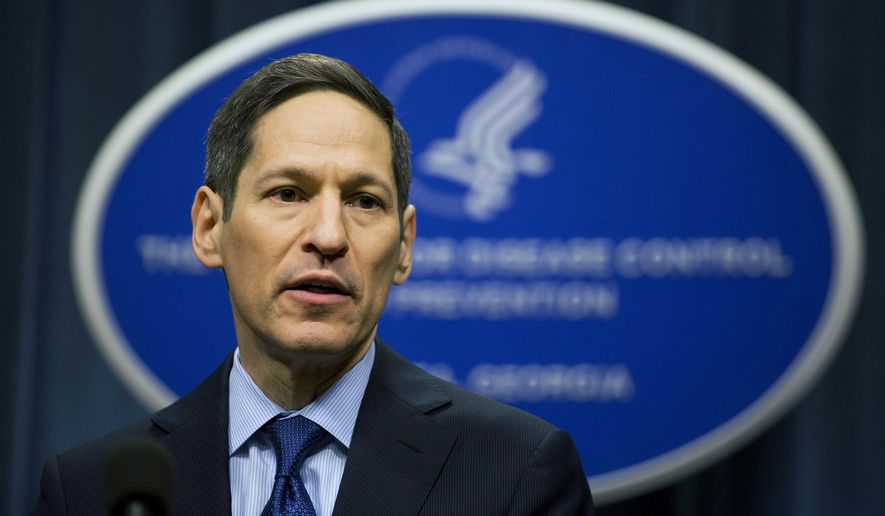A likely surge this fall in the number of U.S. infants born with defects will serve as a sobering admonition to members of Congress who have stalemated over funds to combat the Zika virus, the physician in charge of the domestic response said Friday.
Dr. Thomas Frieden, director of the Centers for Disease Control and Prevention, said that funding for critical Zika research and mosquito control is “essentially all spent.”
If Congress doesn’t pony up more before September ends, the push for better diagnostic tests for Zika and methods to wipe out disease-carrying insects will slow down, Dr. Frieden said.
Research into how the virus effects pregnant women and the unborn will fall off course, the director said, and the CDC won’t be able to pay agency workers who’ve been borrowed from other projects, leaving the nation vulnerable to Zika over the long term.
“The decisions that are made in the coming weeks are going to have implications for decades to come — for individuals, for families, for communities,” Dr. Frieden said.
The CDC estimates that 100 to 300 babies will be born with abnormally small heads, or microcephaly, in Puerto Rico after this mosquito season.
Seventeen infants have been born with Zika-related problems on the U.S. mainland, though Dr. Frieden expects to see “a bunch of kids born with microcephaly” in the coming months.
Microcephaly is the most recognizable defect associated with Zika, though it has been linked to an array of other problems, including calcium deposits in the brain and stillbirths.
“I hope Congress will do the right thing and provide additional resources to protect pregnant women,” said Dr. Frieden, whose agency received $222 million for the domestic response from the Ebola fight in West Africa and other research priorities.
Capitol Hill is struggling to break an impasse over how much money it should spend on the fight, and how the money should be used.
Senators reached a compromise earlier this year that called for $1.1 billion in Zika money — $800 million less than President Obama requested in February — and added it all to the deficit. The House approved $622 million, and called for it to be paid for by shifting money, so it didn’t add to the deficit.
Senate Democrats filibustered a $1.1 billion plan that took $750 million from Ebola, Obamacare and other accounts and left Planned Parenthood out of its contraception plans.
On Friday, the House emerged from closed-door split over whether to accept Democrats’ demand for a “clean” Zika funding as part of a short-term spending bill to keep the government running past Sept. 30.
Rep. David Jolly, Florida Republican, was adamant that his party would accept the demands of the Senate Democrats, which include dropping restrictions on Zika funds going to Planned Parenthood.
“We’re going to have to swallow hard and vote for it,” Mr. Jolly said. “At the end of the day you’ve got to negotiate and take some things out.”
The Zika issue did not dominate the meeting, which was focused more on the stopgap spending bill known as a continuing resolution.
Republicans largely agreed that the resolution should provide funding for just three months to allow a new spending debate following the elections. Money for Zika, however, is intertwined with the fate of that bill.
Rep. Ryan Zinke said he believed more members backed giving the Democrats the “clean” Zika funding to avoid any more delays in fighting the disease.
“Let’s put Zika ahead of politics,” said Mr. Zinke, Montana Republican.
Others wanted to stand firm and force Senate Democrats to compromise.
“What we’ve done on Zika is the right pathway. The Senate is the one that deserves the scrutiny,” said Rep. Jeff Fortenberry, Nebraska Republican.
He said that he would insist that any Zika funding in a continuing resolution would only provide money to “responsible health care entities.”
The contraception fight hinges on Planned-Parenthood-aligned clinics in Puerto Rico, where the CDC estimates that 6,000 to 10,000 pregnant women will contract Zika before mosquito populations diminish in the colder months.
“It’s a beautiful island, but they were dealt a bad hand when it comes to this mosquito,” Dr. Frieden said.
As it stands, he said, women on the island do not have adequate access to modern contraceptives and are more likely to have unplanned pregnancies than on the mainland.
More broadly, Dr. Frieden said Zika is emerging as a global problem in Asia and Africa. Transmission in Singapore is surging, for instance, even though the city-state has 500 full-time inspectors to knock out mosquitoes that cause Zika and diseases like dengue.
Back home, Florida has recorded 56 cases of mosquito-borne Zika, and it is turning to aerial spraying to tamp down transmission in the tourist hot spot of Miami Beach.
Even as temperatures cool, countries in South America will enter the summer, leaving the U.S. exposed to travelers who might bring the virus back with them on the cusp of the next mosquito season.
“Zika is going to be around,” Dr. Frieden said. “Zika is likely to become endemic in this hemisphere. That means it will continue to spread at some level for years to come.”
• Tom Howell Jr. can be reached at thowell@washingtontimes.com.
• S.A. Miller can be reached at smiller@washingtontimes.com.




Please read our comment policy before commenting.